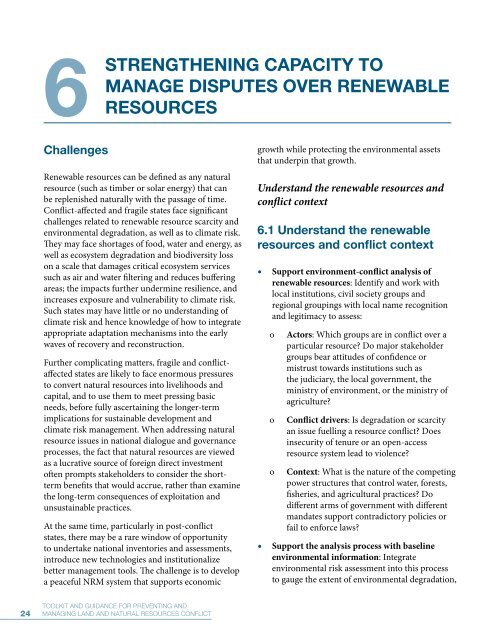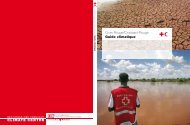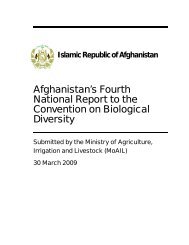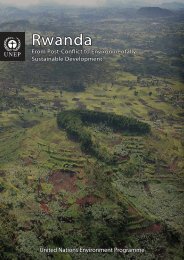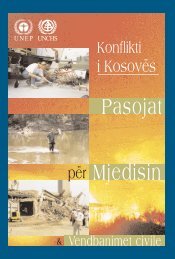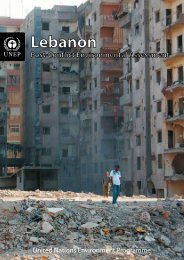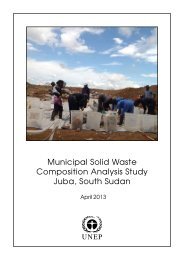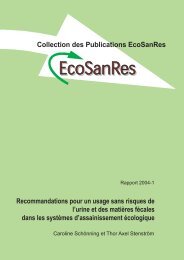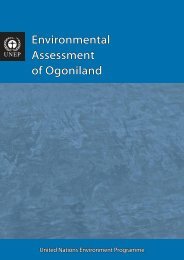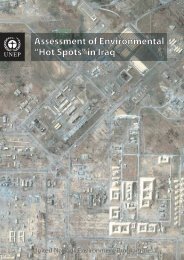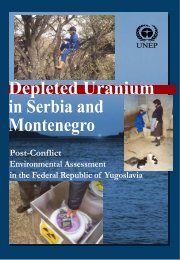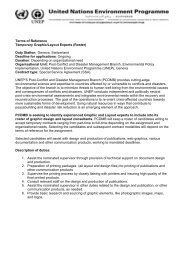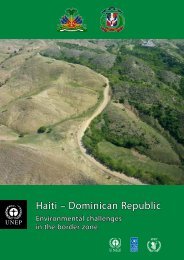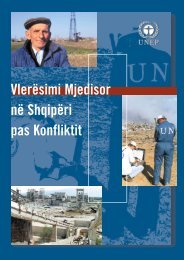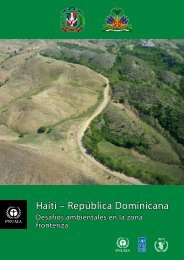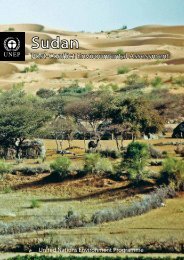Strengthening capacity - Disasters and Conflicts - UNEP
Strengthening capacity - Disasters and Conflicts - UNEP
Strengthening capacity - Disasters and Conflicts - UNEP
You also want an ePaper? Increase the reach of your titles
YUMPU automatically turns print PDFs into web optimized ePapers that Google loves.
6<br />
STRENGTHENING<br />
CAPACITY TO<br />
MANAGE DISPUTES OVER RENEWABLE<br />
RESOURCES<br />
Challenges<br />
Renewable resources can be defined as any natural<br />
resource (such as timber or solar energy) that can<br />
be replenished naturally with the passage of time.<br />
Conflict-affected <strong>and</strong> fragile states face significant<br />
challenges related to renewable resource scarcity <strong>and</strong><br />
environmental degradation, as well as to climate risk.<br />
They may face shortages of food, water <strong>and</strong> energy, as<br />
well as ecosystem degradation <strong>and</strong> biodiversity loss<br />
on a scale that damages critical ecosystem services<br />
such as air <strong>and</strong> water filtering <strong>and</strong> reduces buffering<br />
areas; the impacts further undermine resilience, <strong>and</strong><br />
increases exposure <strong>and</strong> vulnerability to climate risk.<br />
Such states may have little or no underst<strong>and</strong>ing of<br />
climate risk <strong>and</strong> hence knowledge of how to integrate<br />
appropriate adaptation mechanisms into the early<br />
waves of recovery <strong>and</strong> reconstruction.<br />
Further complicating matters, fragile <strong>and</strong> conflictaffected<br />
states are likely to face enormous pressures<br />
to convert natural resources into livelihoods <strong>and</strong><br />
capital, <strong>and</strong> to use them to meet pressing basic<br />
needs, before fully ascertaining the longer-term<br />
implications for sustainable development <strong>and</strong><br />
climate risk management. When addressing natural<br />
resource issues in national dialogue <strong>and</strong> governance<br />
processes, the fact that natural resources are viewed<br />
as a lucrative source of foreign direct investment<br />
often prompts stakeholders to consider the shortterm<br />
benefits that would accrue, rather than examine<br />
the long-term consequences of exploitation <strong>and</strong><br />
unsustainable practices.<br />
At the same time, particularly in post-conflict<br />
states, there may be a rare window of opportunity<br />
to undertake national inventories <strong>and</strong> assessments,<br />
introduce new technologies <strong>and</strong> institutionalize<br />
better management tools. The challenge is to develop<br />
a peaceful NRM system that supports economic<br />
growth while protecting the environmental assets<br />
that underpin that growth.<br />
Underst<strong>and</strong> the renewable resources <strong>and</strong><br />
conflict context<br />
6.1 Underst<strong>and</strong> the renewable<br />
resources <strong>and</strong> conflict context<br />
Support environment-conflict analysis of<br />
renewable resources: Identify <strong>and</strong> work with<br />
local institutions, civil society groups <strong>and</strong><br />
regional groupings with local name recognition<br />
<strong>and</strong> legitimacy to assess:<br />
o<br />
o<br />
o<br />
Actors: Which groups are in conflict over a<br />
particular resource Do major stakeholder<br />
groups bear attitudes of confidence or<br />
mistrust towards institutions such as<br />
the judiciary, the local government, the<br />
ministry of environment, or the ministry of<br />
agriculture<br />
Conflict drivers: Is degradation or scarcity<br />
an issue fuelling a resource conflict Does<br />
insecurity of tenure or an open-access<br />
resource system lead to violence<br />
Context: What is the nature of the competing<br />
power structures that control water, forests,<br />
fisheries, <strong>and</strong> agricultural practices Do<br />
different arms of government with different<br />
m<strong>and</strong>ates support contradictory policies or<br />
fail to enforce laws<br />
Support the analysis process with baseline<br />
environmental information: Integrate<br />
environmental risk assessment into this process<br />
to gauge the extent of environmental degradation,<br />
24<br />
TOOLKIT AND GUIDANCE FOR PREVENTING AND<br />
MANAGING LAND AND NATURAL RESOURCES CONFLICT


